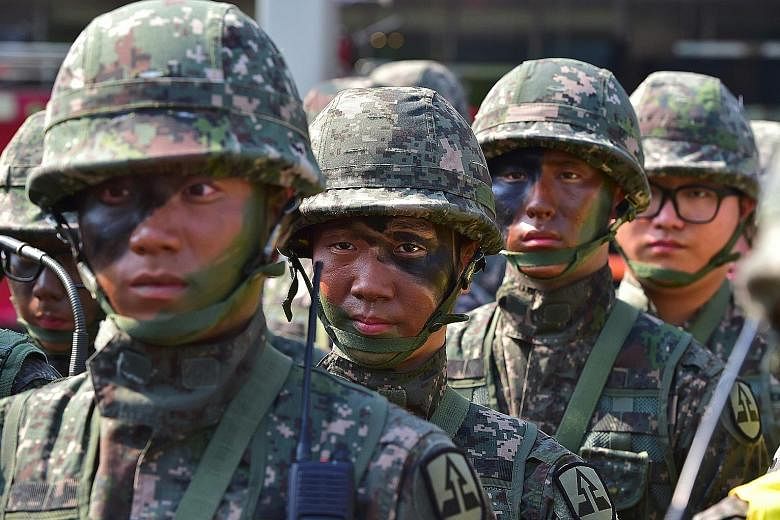SEOUL • South Korea's Defence Ministry has said it is pushing to scrap nearly all existing exemptions to mandatory military service, citing a shortfall in the number of conscripts.
Some 28,000 able-bodied men are exempted every year, either because of the nature of their academic studies, or because they opt to serve their time in the police force or fire service instead.
"Considering the country's population forecast, we are expecting a shortfall in military personnel of around 20,000 to 30,000 by 2023," a ministry official said yesterday.
The plan, which is still being negotiated with other concerned ministries, would see the exemptions phased out over three years, beginning in 2020.
Over 60 years after an armistice ended fighting in the Korean War, every South Korean man aged between 18 and 35 is required to perform two years of military service. The main rationale is the continued threat from nuclear-armed North Korea, given that the 1950-1953 Korean conflict ended with a ceasefire rather than a peace treaty, leaving the two Koreas technically at war.
"The mandatory military service is being maintained in consideration of our security situation arising from the division of the two Koreas," a ministry spokesman told Agence France-Presse.
The South Korean military relies heavily on conscription, and military service often involves postings to front-line positions on the border with North Korea.
For many, the two-year duty is an unwanted and resented intrusion that interferes with studies or nascent careers and serves no discernible purpose, especially in a rapidly ageing society where the size of the workforce is dwindling.
Those given a pass include holders of master's degrees in engineering, who can opt instead for three years at a research institute.
The vast majority, however unwillingly, buckle down, knowing that refusal to serve means an automatic prison term and a criminal record that precludes any future job with the government or a major corporation.
Still, some young South Korean men try to wriggle their way out of the draft every year, using tactics ranging from extended overseas studies to starving themselves so that they fail the medical exam.
A few years ago, there was a mini-fad for large tattoos, which carry an organised-crime association in South Korea and can result in people being declared unsuitable for military service.
Others openly defy the draft order, citing religious, moral or political reasons, namely Jehovah's Witnesses, with some 600 people yearly opting for an 18-month prison term.
AGENCE FRANCE-PRESSE

